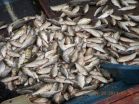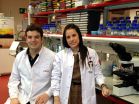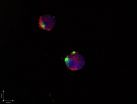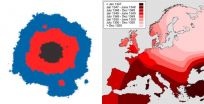High-fat diet postponing brain aging
2014-11-05
(Press-News.org) New Danish-led research suggests that signs of brain aging can be postponed in mice if placed on a high-fat diet. In the long term, this opens the possibility of treatment of children suffering from premature aging and patients with Alzheimer's and Parkinson's disease. The research project is headed by the Center for Healthy Aging, University of Copenhagen and the National Institute of Health.
When we get older, defects begin to develop in our nervous system, our brain loses some of its intellectual capacity, and the risk of developing diseases such as Parkinson's and Alzheimer's increases. Alzheimer's disease is currently the fastest-growing age-related disease.
Throughout our lives, it is important that our cells – to the extent possible – keep our DNA undamaged, and, therefore, the cells have a system that repairs the damage that occurs all the time. Humans age when the repair system ceases to function. In diseases such as Alzheimer's, the researchers also see damage to the DNA
A new research project headed by the Center for Healthy Aging, University of Copenhagen and the National Institute of Health has studied mice having a defect in their DNA repair system. In humans, this defect causes the disorder Cockayne syndrome, where patients prematurely age as children and die at an age of 10-12 years. The study shows that placing a mouse model of Cockayne syndrome on a high-fat diet will postpone aging processes such as impaired hearing and weight loss.
Fat putting a stop to premature ageing
"The study is good news for children with Cockayne syndrome, because we do not currently have an effective treatment. Our study suggests that a high-fat diet can postpone aging processes. A diet high in fat also seems to postpone the aging of the brain. The findings therefore potentially imply that patients with Alzheimer's and Parkinson's disease in the long term may benefit from the new knowledge," says Professor Vilhelm Bohr from the Center for Healthy Aging, University of Copenhagen and the National Institute of Health, who has headed the study.
Our brain has a constant need for fuel in the form of either sugar or so-called ketones. Ketones are the brain's fuel reserve, and, in particular, play an important role in periods of low blood sugar levels, e.g. if you are fasting. This is because the body breaks down fat if it needs sugar, and during this process it produces ketones. The researchers see a particular positive effect when the mice are given the so-called medium chain fatty acids – e.g. from coconut oil.
Brain cells need extra fuel
"In cells from children with Cockayne syndrome, we have previously demonstrated that aging is a result of the cell repair mechanism being constantly active. It eats into the resources and causes the cell to age very quickly. We therefore hope that a diet with a high content of coconut oil or similar fats will have a beneficial effect, because the brain cells are given extra fuel and thus the strength to repair the damage," says postdoc Morten Scheibye-Knudsen from the National Institute of Health.
INFORMATION:
The study has just been published in the recognised scientific journal Cell Metabolism. The research project is supported by the Nordea-fonden through the Center for Healthy Aging.
Contact:
Professor Vilhelm Bohr, tel. +1-410-558-8162
Postdoc Morten Scheibye-Knudsen, tel. +1-410-971-0071
ELSE PRESS RELEASES FROM THIS DATE:
2014-11-05
Using DESY's ultrabright X-ray source PETRA III, researchers have observed in real-time how football-shaped carbon molecules arrange themselves into ultra-smooth layers. Together with theoretical simulations, the investigation reveals the fundamentals of this growth process for the first time in detail, as the team around Sebastian Bommel (DESY and Humboldt Universität zu Berlin) and Nicola Kleppmann (Technische Universität Berlin) reports in the scientific journal Nature Communications. This knowledge will eventually enable scientists to tailor nanostructures ...
2014-11-05
Researchers at the Cognition and Brain Plasticity group of the Bellvitge Biomedical Research Institute (IDIBELL) and the University of Barcelona have been tracking the traces of implicit and explicit memories of fear in human. The study has been published in the journal Neurobiology of Learning and Memory and describes how in a context of fear, our brain differently encodes contextual memory of a negative event (the place, what we saw...) and emotional response associated.
The study measures electrodermal activity of 86 individuals in a fearful generated in the laboratory ...
2014-11-05
Bethesda, MD (Nov. 5, 2014) — Up to 15 percent of the general adult population is affected by irritable bowel syndrome (IBS), and most patients struggle to find effective drug therapy. A new guideline from the American Gastroenterological Association (AGA) provides these patients and their physician's guidance. The new guideline and accompanying technical review have been published in Gastroenterology, the official journal of the AGA Institute.
"Because no IBS therapy is uniformly effective, many patients describe a history of a variety of treatments alone or in ...
2014-11-05
What sounds counter-intuitive to an activity commonly perceived as quiet is the broad recommendation of scientists at Michigan State University (MSU) recommending that small-scale fishing in the world's freshwater bodies must have a higher profile to best protect global food security.
In this month's journal Global Food Security, scientists note that competition for freshwater is ratcheting up all over the world for municipal use, hydropower, industry, commercial development, and irrigation. Rivers are being dammed and rerouted, lakes and wetlands are being drained, fish ...
2014-11-05
Noonan syndrome is a rare disease that is characterised by a set of pathologies, including heart, facial and skeletal alterations, pulmonary stenosis, short stature, and a greater incidence of haematological problems (mainly juvenile myeloid leukaemia, or childhood leukaemia). There is an estimated incidence of 1 case for every 1,000–2,500 births, and calculations show some 20,000–40,000 people suffer from the disease in Spain. From a genetic point of view, this syndrome is associated to mutations in 11 different genes —the K-Ras gene among them— ...
2014-11-05
PATIENTS with a specific type of oesophageal cancer survived longer when they were given the latest lung cancer drug, according to trial results being presented at the National Cancer Research Institute (NCRI) Cancer Conference today (Wednesday).
Up to one in six patients with oesophageal cancer were found to have EGFR duplication in their tumour cells and taking the drug gefitinib, which targets this fault, boosted their survival by up to six months, and sometimes beyond.
This is the first treatment for advanced oesophageal cancer shown to improve survival in patients ...
2014-11-05
Fatih Uckun, Jianjun Cheng and their colleagues have taken the first steps towards developing a so-called "smart bomb" to attack the most common and deadly form of childhood cancer — called B-lineage acute lymphoblastic leukemia (ALL).
In a November study in the new peer-reviewed, open-access journal EBioMedicine, they describe how this approach could eventually prove lifesaving for children who have relapsed after initial chemotherapy and face a less than 20 percent chance of long-term survival.
"We knew that we could kill chemotherapy-resistant leukemia cells ...
2014-11-05
The current Ebola outbreak shows how quickly diseases can spread with global jet travel.
Yet, knowing how to predict the spread of these epidemics is still uncertain, because the complicated models used are not fully understood, says a University of California, Berkeley biophysicist.
Using a very simple model of disease spread, Oskar Hallatschek, assistant professor of physics, proved that one common assumption is actually wrong. Most models have taken for granted that if disease vectors, such as humans, have any chance of "jumping" outside the initial outbreak area ...
2014-11-05
Researchers using a new type of tracking device on female elephant seals have discovered that adding body fat helps the seals dive more efficiently by changing their buoyancy.
The study, published November 5 in the Proceedings of the Royal Society B, looked at the swimming efficiency of elephant seals during their feeding dives and how that changed in the course of months-long migrations at sea as the seals put on more fat. The results showed that when elephant seals are neutrally buoyant--meaning they don't float up or sink down in the water--they spend less energy ...
2014-11-05
A University of Oregon researcher wants those "R" words to resonate among young athletes. They are key terms used in an online educational tool designed to teach coaches, educators, teens and parents about concussions.
Brain 101: The Concussion Playbook successfully increased knowledge and attitudes related to brain injuries among students and parents in a study that compared its use in 12 high schools with the usual care practices of 13 other high schools during the fall 2011 sports season. The findings are online ahead of print in the Journal of Adolescent Health.
Participants, ...
LAST 30 PRESS RELEASES:
[Press-News.org] High-fat diet postponing brain aging







